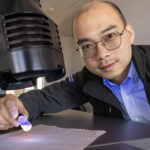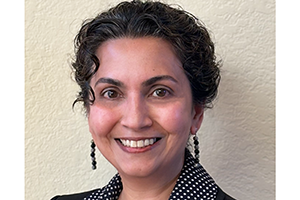A UWM engineering faculty member was accepted into the national I-Corps Program to help him further commercialize miniature electrochemical water sensors that he developed. I-Corps, supported by the National Science Foundation, helps academic researchers transfer their lab discoveries to the marketplace.
Woo-Jin Chang, an associate professor of mechanical and biomedical engineering, has created sensors that can detect lowlevels of heavy metals, water acidity and nutrients in a single drop of drinking water. Chang’s sensorsperform instantaneously and are cost-effective.
Chang advanced to the national I-Corps program, which comes with a $50,000 grant, after working with NSF-I-Corps, Southeastern Wisconsin. The local I-Corps program is co-led by Brian Thompson, president of UWM Research Foundation and director of UWM’s Lubar Entrepreneurship Center, and Ilya Avdeev, associate professor of mechanical engineering and director of innovation at the LEC.
Through I-Corps, Chang will investigate different kinds of potential customers and further develop the devices to meet their needs. Three Wisconsin companies already have licensed the sensors in non-exclusive contracts.
The thin, disposable sensors are the size of a small Band-Aid and cost about $2 each. “My goal is to create a commercial sensor that anyone could purchase for less than $1,” Chang said.
The sensors could be useful to a wide range of customers, including well owners, water equipment manufacturers, brewery owners, swimming pool managers and aquarium owners.
Chang began developing the sensors in 2013 through collaborative research with the Water Equipment and Policy Center.
Other members of Chang’s I-Corps team include Rathindra “Babu” DasGupta, senior scientist and the team mentor, and Mohammad Rizwen Ur Rahman, a doctoral student in mechanical engineering who is the entrepreneurial lead.







